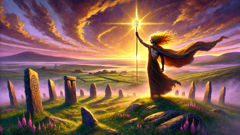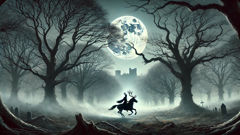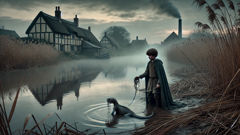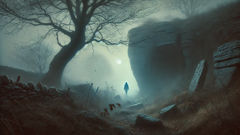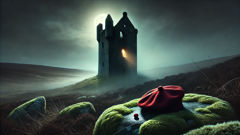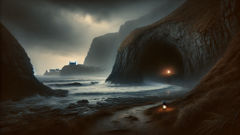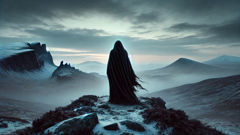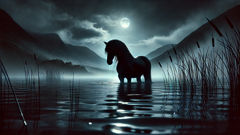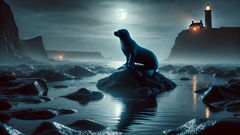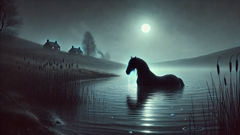Introduction
Long before written words settled on parchment and ink, Ireland was a land woven of stories and song. Mist swirled across green hills and dark lakes, concealing mysteries that still whisper from stone circles and ancient burial mounds. It was an age when gods walked among mortals and every river, tree, and mountain held a spirit. At the heart of these tales lies Lugh of the Long Arm—a god with the hands of a craftsman and the heart of a hero, whose very name was once spoken with awe beside fires under the stars. The legend of Lugh is a story of shimmering beginnings and shadowed threats, where the forces of creativity and light battle monstrous foes born of chaos. Lugh’s tale rises from secret trysts and prophecies, unfolds in fosterage among wise magicians, and surges into battle against Balor, the one-eyed tyrant whose baleful gaze threatened to plunge Ireland into eternal darkness. Through the drama of kinship and exile, riddles and weapons, betrayal and triumph, the legend explores what it means to be chosen—not only by blood or destiny but by the willingness to stand against fear for the sake of all. Lugh’s gifts are many: smithwork, poetry, music, the skills of healing, and the strategies of war. Yet none of these alone would suffice, were it not for his courage to face the darkness within and without. This is a story rich with color and song, brimming with the scent of rain-damp earth, the clang of iron, the glint of sunlight on bronze shields, and the ancient pulse of Irish myth. Whether you come seeking adventure, wisdom, or the simple pleasure of a well-told tale, Lugh’s legend offers a doorway into a world where anything is possible, and the fate of gods and mortals turns on a single arm’s reach.
A Child of Prophecy: The Birth and Fosterage of Lugh
In the time when gods and monsters shaped the fate of Ireland, a prophecy troubled the Fomorian king, Balor of the Evil Eye. Balor, whose single, venomous eye could kill armies with a glance, ruled from the black island fortress of Tory with a fist of iron. He heard a whisper that someday his own grandson would bring about his death. To guard against this doom, Balor locked his daughter, Ethniu, high in a tower surrounded by guards, spells, and the cold sea. But fate is sly, and love finds cracks in even the thickest walls.
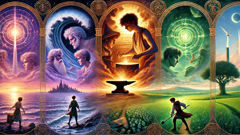
Cian, a warrior of the Tuatha Dé Danann—the tribe of the gods—was drawn to Ethniu by a series of mystical twists. With the help of the wily druidess Biróg, Cian reached Ethniu’s prison. Their secret union produced a child: Lugh, whose very existence was a challenge to Balor’s dominance. When news reached Balor, he ordered the infant drowned, but fate intervened again. The baby was swept away, rescued by Biróg, and spirited across the green hills to safety.
Lugh’s childhood was a patchwork of fosterage and learning. He was raised by Manannán mac Lir, god of the sea, who taught him the ways of water, concealment, and magic. Goibhniu, the divine smith, shared with him the secrets of forging weapons and shaping metal with fire. From Dian Cecht, the healer, he learned how to mend wounds; from Lugh’s uncle Nuada, how to lead and judge; from Ogma, the champion, how to wield both sword and wisdom. Under the careful guidance of Tailtiu, his foster-mother, he learned compassion and the value of endurance.
Lugh’s skills grew as swiftly as the summer grass. He mastered poetry, music, and games of strategy. He could hurl the spear with unmatched precision, craft jewelry finer than sunlight on water, and heal the sick with gentle hands. Yet the shadow of prophecy never left him. Sometimes at twilight, Lugh would stare into the mist beyond the hills and feel a pull—an invisible thread tying him to a fate both glorious and grim.
As he approached manhood, Lugh understood that he was not only the heir of gods but also the hope of a people suffering under Fomorian oppression. The Fomorians—giant and monstrous, with skin like night and eyes like storms—exacted harsh tribute from the Tuatha Dé Danann: a third of every harvest, a third of every child born. Their cruelty stifled the land, and whispers of rebellion grew among the oppressed.
One evening, as the sky turned indigo and fireflies danced in the meadows, Lugh sat with his foster-father Manannán beside the restless sea. The old god watched him with gentle eyes. “The world is not made by force alone,” Manannán said. “It is shaped by craft, by wit, by the song you sing into the darkness. Remember that when your time comes.”
Lugh listened, knowing the time was near. His destiny waited across the hills, where his talents would be tested not just in the forge or at the harp, but in battle and the labyrinth of fate.
The Gate of Tara: Lugh Proves Himself
When Lugh came of age, he set his feet on the path to Tara—the seat of the High King and the heart of Tuatha Dé Danann power. Tara was more than a palace; it was a symbol, a promise that Ireland’s light would never be fully dimmed. But at this time, the halls of Tara echoed with sorrow. The Fomorians demanded tribute, and King Nuada—though wise—had lost his hand in an earlier battle, leaving the people uncertain and vulnerable.
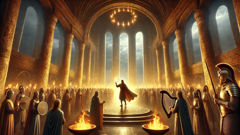
Lugh arrived at Tara’s great gates as a stranger. The doorkeeper—an old warrior with wary eyes—challenged him. “What art do you bring? Only those with a skill may enter Tara.”
Lugh smiled. “I am a smith.”
“We have a smith.”
“I am a poet.”
“We have a poet.”
“I am a harpist.”
“We have a harpist.”
So it went: warrior, healer, sorcerer, historian. For every craft Lugh claimed, Tara already had a master. But Lugh, undaunted, said: “Do you have one who is master of all these arts?” The doorkeeper could not answer, and so Lugh was admitted.
Within the halls, Lugh’s presence sparked curiosity. He dazzled the court with feats of skill: forging blades so keen they could split a hair; playing music that stilled sorrow; healing wounds with a touch. He matched wits with Ogma in riddles and bested champions at games. Soon, he was called Samildánach—the Many-Skilled.
But Lugh’s greatest challenge lay ahead. The Fomorians, led by Balor and his brutal general Bres, sent envoys to collect tribute. Their threats darkened Tara’s hearths. Lugh urged the court to resist, but doubt shadowed Nuada’s face. “The Fomorians are strong. Their magic is old and bitter. What hope have we?”
Lugh replied, “The hope that lies in unity. In each art, each hand, each heart. I will gather the craftsmen and warriors. We will prepare.”
He summoned Goibhniu to forge spears that never missed; Dian Cecht to brew healing potions; the sorcerer Mathgen to bend stones and earth; the cupbearer to pour drinks that invigorated courage. Lugh did not rule by command but by inspiring others to give their best. Where there was discord, he brought harmony. Where there was fear, he sowed resolve.
Night after night, he studied the Fomorian forces—spies returned with news of monstrous warriors and strange magics. Lugh crafted plans, teaching the people to defend their land not only with weapons but with cleverness, song, and hope.
One evening, as fire crackled in the great hall and rain lashed against Tara’s stones, Lugh stood before the assembled court. His long arm lifted, he spoke: “I am not only my father’s son or my mother’s prophecy. I am the sum of every lesson, every kindness, every test. Let us stand together and reclaim Ireland.”
The court roared in approval. In that moment, hope flickered back to life in Tara. The days of tribute would soon end.
The Battle of Mag Tuired: Light Against Shadow
The hour of reckoning came on the windswept plain of Mag Tuired. For days before the battle, Lugh led preparations: smiths forged weapons that never failed; healers brewed draughts for strength; druids called up mists and enchanted the land itself. The Tuatha Dé Danann gathered—warriors with faces painted in swirling blue, musicians whose songs stirred courage, and cunning magicians who shaped the elements. Yet still, the Fomorian threat loomed like a storm on the horizon.
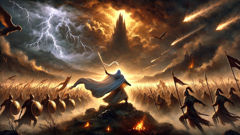
On the morning of battle, a chill mist clung to the earth. Across the plain stood Balor’s forces—giants with twisted limbs, skin like basalt, eyes that flashed with malice. Balor himself towered above all, his face shadowed by a heavy brow. At his side stood Bres, once king among the Tuatha Dé Danann but now traitor, his bitterness turned to venom.
The clash began with a thunderous roar—spears flew, shields shattered, spells wove patterns of fire and darkness across the field. Lugh fought at the front, his long arm hurling his spear with blinding speed. Where he passed, Fomorian lines faltered. But Balor’s evil eye remained hidden behind heavy lids—his power so great that even his own kin feared to meet his gaze.
As hours passed, the battle swayed like tall grass in a gale. The Tuatha Dé Danann pressed forward, but every gain was met with monstrous resistance. Balor strode onto the field at last. His eyelid was lifted by four strong warriors, exposing the deadly eye. Where he looked, warriors fell like sheaves at harvest, their bodies stilled by a magic older than time.
Lugh saw his chance. Slipping through the chaos, he called out to Balor—not with hatred, but with the clarity of fate. Balor turned his eye upon him. In that moment, time seemed to slow. Lugh remembered every lesson: Manannán’s warnings against brute force; Goibhniu’s precision; Tailtiu’s endurance.
He took his sling—a gift from Manannán—and placed within it a stone of the sacred earth. Spinning once, twice, thrice, he loosed the stone at Balor’s monstrous eye. With a sound like thunder cracking mountains, the stone struck true. Balor’s eye burst from its socket and fell backward, its lethal gaze now turned on his own army. The Fomorians screamed as their leader fell. The tide of battle turned; the monstrous host broke and fled.
In the aftermath, Lugh stood over the fallen king—his own grandfather—grief and triumph mingling in his heart. He knew that prophecy’s weight was never light. The Fomorian yoke was broken. Ireland’s light would rise again.
Yet Lugh did not claim victory for himself alone. He gathered the wounded, honored the dead on both sides, and ordered that peace and justice mark the new age. He did not forget the lessons of sorrow, nor the costs of war. The land itself seemed to sigh in relief, rain falling softly to wash away blood and sorrow.
Conclusion
With Balor’s defeat at Mag Tuired, a new dawn broke over Ireland. The Tuatha Dé Danann no longer paid tribute to monsters; instead, they restored harmony to the land. Lugh became king—not through conquest alone, but through wisdom and generosity. His rule was marked by a flowering of art and learning: poets sang new verses; smiths forged wonders; healers tended all, regardless of clan or kind. Every harvest festival echoed with gratitude for Lugh’s courage and craft. Yet Lugh never forgot the shadow that once threatened Ireland. He honored those who fell in battle, including Balor—a reminder that even enemies are woven into fate’s tapestry. Under his guidance, the people learned that light and darkness are forever entwined; it’s in facing the deepest shadows that one’s true gifts are revealed. The story of Lugh endures because it’s more than a tale of war or prophecy. It’s a celebration of every gift—small or great—that shapes a better world. In every act of courage, every work of beauty, every stand against injustice, Lugh’s spirit lives on. And so, when morning mist curls over Irish hills or a craftsman’s hand brings forth something new, those who remember whisper: “That is the touch of Lugh of the Long Arm—hero, king, and master of all arts.”

